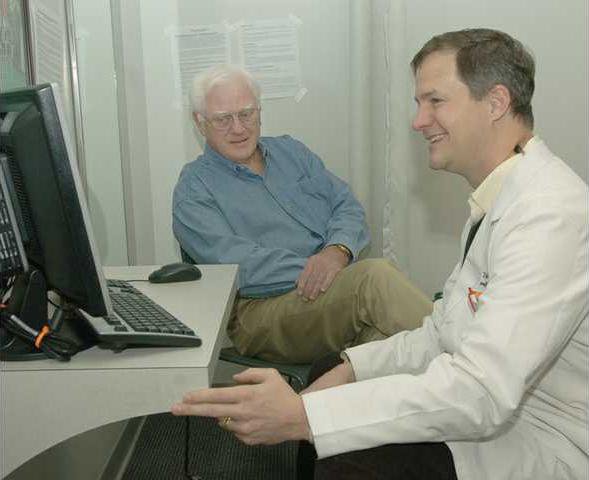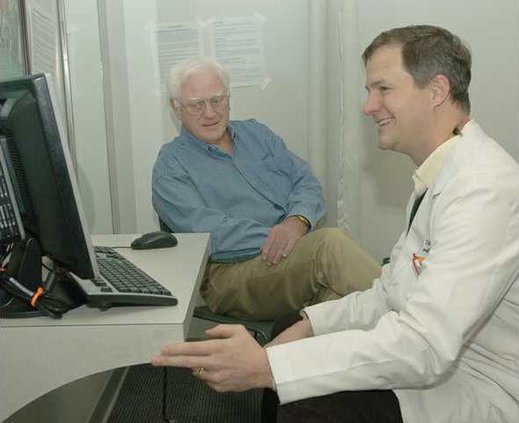0123conciergeaud
Dr. Jeff Terry explains why he decided to start DirectCare.Imagine having a doctor who’s available by cell phone 24 hours a day, who handles your care personally if you’re hospitalized, who doesn’t rush through your appointment so he can see his next patient.
Gainesville has that doctor. But if you want to be one of his patients, it will cost you extra.
Dr. Jeffrey Terry, an internal medicine physician at Northeast Georgia Diagnostic Clinic, is the first doctor in the area to offer "concierge" medicine.
Under this model, becoming popular in major cities, patients pay an annual fee to the physician, in addition to usual insurance premiums and co-pays. In return, they get greater access and one-on-one care.
Terry will switch his practice to the concierge model on Feb. 1. He will remain a partner at the Diagnostic Clinic, where he has worked for eight years. But his "practice within a practice," known as DirectCare, will have only a few hundred patients. Now he has about 3,000.
Terry, 41, said he decided on the change because he was frustrated with managed care. Reimbursement levels are so low that doctors cram in as many appointments as possible to break even financially, which limits time with each patient.
For Terry, the most appealing aspect of the concept was getting rid of time constraints.
"Now, you see patients for as little as five minutes," he said. "And they have to focus on just one problem, even though they may have three or four problems."
At DirectCare, appointments will be set 30 minutes apart, so if Terry needs extra time with a patient, it won’t cause a backup in the waiting room. He’ll also offer same-day or next-day appointments to his patients, even if their problem is not urgent.
He promises to return phone calls promptly, and will even provide patients with his cell-phone number.
Terry will treat his patients when they’re in the hospital, something few primary-care physicians do. Most doctors now turn responsibility over to specialized physicians who oversee patients’ care in the hospital.
It sounds like the kind of health care most doctors would prefer to practice and most patients would prefer to receive. But to make it work financially, each patient pays a fee.
At DirectCare, that annual charge will be $1,600, and it’s not covered by insurance. But in exchange, each patient gets a comprehensive wellness exam every year. That includes a detailed physical exam, vision and hearing tests, chest X-ray, EKG, lung function test, body fat analysis, urinalysis and extensive blood tests to screen for a wide variety of diseases.
Terry said the array of tests will be standard, regardless of the patient’s age or health. "The annual exam will allow us to predict problems before they happen," he said.
In December, Terry sent letters to all his patients, explaining his decision to start DirectCare and asking them to indicate whether they wanted to stay with his practice or opt out.
Emmett Forrester, chief financial officer of Northeast Georgia Diagnostic Clinic, said the clinic’s internal medicine group has about 12 doctors.
"Before Jeff decided to do this, he first got the blessing of the group," Forrester said. "The other doctors agreed to take his patients who choose not to sign up with DirectCare, even if they’re not accepting new patients from outside the practice."
Of course, patients could go elsewhere for their medical care. But Forrester said most people seemed to want to stay with the Diagnostic Clinic.
For those who are thinking of enrolling in DirectCare, Terry has held several meetings to answer their questions.
"Their main concern has been the cost," he said. "When I made the decision, I knew it would be difficult for a number of patients to be able to afford the service. We settled on an amount we thought would be acceptable to (most of) our patients."
There also have been a lot of questions about Medicare and private insurance. Terry said patients’ insurance plans will continue to be billed for any of services normally covered.
He said older patients and those with numerous health problems seem most enthusiastic about DirectCare.
"But some people in their 30s have also signed up," he said. "They like the idea of the annual exam."
Terry said after existing patients have had the opportunity to accept or refuse, DirectCare will be opened up to the public.
Forrester estimates DirectCare will be financially viable if it enrolls between 300 and 600 patients. The annual fee helps compensate for the fact that Terry will see far fewer patients per day, he said.
He acknowledges that if most doctors switched to a concierge model, it would result in a huge shortage of physicians.
"Obviously, this is not something a specialist could do. This model is geared toward primary care physicians," Forrester said. "Maybe one or two other doctors (at the Diagnostic Clinic) might try this, but certainly not all of them."
He noted that the addition of DirectCare does not imply that Terry is somehow better than any of the clinic’s other doctors.
"This is not saying that if you go to a regular physician, you’re getting substandard care," Forrester said. "We’re just marketing this as a higher level of service."




